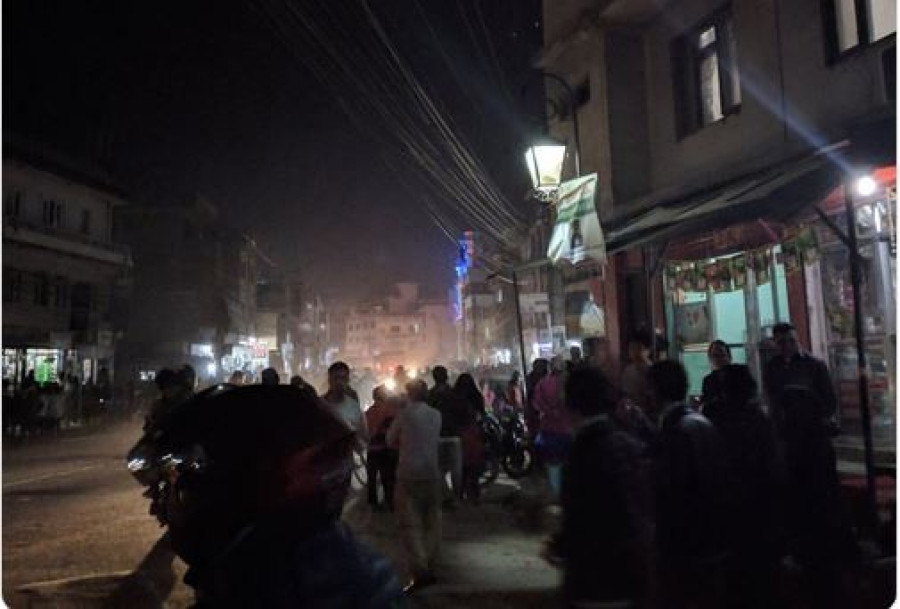Valley
Blast, arsons targeting Ncell prompt concerns about business climate
A blast in the Capital, claiming one life and injuring two others, near the gate of Ncell office in Nakkhu, and arson attacks targeting at least a dozen telephone towers of the mobile company on Friday night in several districts came as reminiscent of the Maoists' war-era days, prompting law enforcement officials to step up security measures.
Nayak Paudel
A blast in the Capital, claiming one life and injuring two others, near the gate of Ncell office in Nakkhu, and arson attacks targeting at least a dozen telephone towers of the mobile company on Friday night in several districts came as reminiscent of the Maoists' war-era days, prompting law enforcement officials to step up security measures.
No group had owned up to the attacks until Saturday, but police suspected they could be the handiwork of the Netra Bikram Chand-led Communist Party of Nepal, an offshoot of the erstwhile CPN (Maoist Centre) that waged a decade-long insurgency.
Singha Prasad Gurung, 49, who was seriously injured in the Nakkhu blast, died while undergoing treatment at Nepal Mediciti Hospital at around 1am Saturday. Two other injured—Pratikshya Khadka, 26, and Nirusha Manandhar, 25—are receiving treatment at the same hospital, police said.
“The health condition of the two females injured in the explosion is stable,” SSP Pooja Singh, spokesperson for the Metropolitan Police Office, told the Post.
Home Minister Ram Bahadur Thapa, Inspector General of Police Sarbendra Khanal and Deputy Inspector General of Police Shailesh Thapa Kshetri, who is also chief of the Metropolitan Police Office, visited the injured at the hospital on Saturday morning.
Our district correspondents reported arson attacks targeting Ncell telephone towers in Achham, Kanchanpur, Nawalparasi, Nuwakot, Gorkha, Kaski and Myagdi. At least four telephone towers were torched in Myagdi alone.
In Achham, police suspected the Chand-led party’s involvement in setting the tower on fire.
"It is still unclear who perpetrated the arson attack," Achham police chief DSP Janak Bahadur Shahi said. "But our preliminary investigation shows the perpetrators could be members of the Chand-led party. Further investigation is under way."
In Kanchanpur, a pamphlet in the name of "Jaya Janata" [hail the people] was found near the Ncell tower which was torched by an unidentified group. “A pamphlet demanding action against Ncell for not paying tax was found at the scene. It has a signature at the end of ‘Jaya Janata’,” DSP Krishna Ojha of Kanchanpur District Police told the Post over the phone. Police said they had not heard of ‘Jaya Janata’, hitherto.
This is a symbolic action, and if ignored, there will be more stern actions, the pamphlet warns. The pamphlet ends with "hail scientific socialism" and "down with tax evader Ncell".
Ncell, which was bought by a Malaysian mobile giant Axiata from Swedish TeleaSonera in April 2016, has been in the news for quite some time for not clearing the capital gains tax.
Responding to a writ petition by a group of civil society members, the Supreme Court on February 6 ordered Ncell and its parent company Axiata to pay capital gains tax. Five days later, the tax authority said Ncell and Axiata’s capital gains tax liability stood at Rs75 billion.
Friday’s blast and arson attacks targeting the private sector mobile company, however, have raised the alarm. Stakeholders on Saturday said such incidents—and their perpetrators—need to be curbed immediately, as this could not only raise questions over the country’s security situation but also disturb the business climate.
A member of the executive committee of the Federation of Nepalese Chambers of Commerce and Industry told the Post that there had been complaints from business people of the eastern region about local level extortions.
“We had held a meeting with the police chief around a month ago to discuss the complaints from the business fraternity,” he said on condition of anonymity citing the sensitivity of the matter. “After that meeting, cases of extortion had come down significantly, but Friday’s incident in the Capital and a series of attacks targeting a particular company have shaken us,” he told the Post.
The Chand-led communist party has long been accused of indulging in extortions and criminal activities.
In February last year, the party detonated “pressure cooker bombs” targeting Ncell towers in Chitwan, Rolpa, Nuwakot and Dhankuta.
In August last year, police arrested its spokesperson Khadga Bahadur Bishwokarma on the charge of torching and vandalising an Ncell tower in Kavre.
The government last year held talks with as many as 22 outfits—armed groups and disgruntled parties. But Chand’s party did not participate in the talks.
The high-level government panel had said its main objective was to make the Communist Party of Nepal give up criminal activities and bring it into the political mainstream. “But its [the panel’s] significance ended after they [CPN] did not show interest,” Suresh Ale Magar, a member of the high-level panel, told the Post in December. The panel then submitted its report in December-end, concluding “there is no more conflict situation in the country”.
Chand formed his own party in 2014 after splitting from another splinter group led by Mohan Baidya. Baidya, along with Chand and other Maoist leaders including Ram Bahadur Thapa, who is home minister in the incumbent government, had walked away from then Unified CPN (Maoist) in June 2012, saying that Pushpa Kamal Dahal’s Maoist party had deviated from the main agenda. Baidya, Thapa and Chand then said they wanted to “create circumstances for a revolution”.
But Chand severed ties with Baidya’s Maoist party in 2014, saying they wanted to take the revolution forward. In a dramatic turn of events, Thapa and some other leaders returned to the mother party in 2016 to join hands with Dahal. Thapa and Chand, comrades in arms for 16 long years, are poles apart today.
With the latest series of attacks, suspicions have grown if the Chand-led outfit has stepped up its activities.
The law enforcement agency said on Saturday that it has intensified security across the country to control any criminal activities.
“Security has been stepped up... every entry and exit points are being checked. The group(s) and individuals involved in the criminal activities will be arrested soon,” Senior Superintendent of Police Uttam Raj Subedi, spokesperson for the Nepal Police, told the Post. “The attackers have not only destroyed a particular company’s property but also claimed a citizen’s life and wounded two others. They cannot escape.”
Police have arrested six persons in connection with the Nakkhu blast. Security guards of Ncell head office have also been detained for interrogation. As many as 20 persons were held in various districts in connection with Friday’s incidents, police said.
While Ncell officials have denied any prior warning to them from any group or individual, police officials said that Ncell was being warned by some groups for around a month.
“If someone gets warned of serious consequences, they should immediately contact police so that preventive measures can be taken and culprits brought to book,” said a police source on condition of anonymity because he was not authorised to speak to the media. “Had Ncell consulted us before, the incident could possibly have been averted.
Attacks on a private sector company, just ahead of the government’s planned investment summit, could rock investors’ confidence, an industrialist said.
The government is organising the investment summit in March-end and pulling out all the stops to woo investors to put money in Nepal.
Last week, Prime Minister KP Sharma Oli, in his inaugural speech at Kantipur Conclave, a two-day global event organised by the Kantipur Media Group, sent across a message to investors around the world, saying "if you have been waiting for the most appropriate time for investing in Nepal, it is now".
“It will hit the confidence and morale of investors willing to make investments in Nepal,” Shekhar Golchha, senior vice-president of the FNCCI, the largest umbrella organisation of the country’s private sector, told the Post. “This incident comes at a time when we [private sector] as well as the government are advocating that Nepal is safe and has appropriate business environment,” he said. “Such incidents can tarnish Nepal’s image in the international arena.”
There was no official statement from the government—neither on the Nakkhu blast nor on arsons in the districts—until the time this paper went to press on Saturday. Politicians from the ruling party as well as the opposition also maintained a conspicuous silence.
Home Minister Thapa, while visiting the injured at the hospital, said the government would provide for the treatment of the injured and pay compensation to the family of deceased Gurung. Thapa also said that police would soon bring those behind the heinous crime to book.
There was no way to ascertain if Friday’s series of attacks was a one-off incident or part of a long-term plan of the perpetrators who are yet to be identified.
“All countries face occasional law and order problems. So, if this incident is seen as an aberration, it won’t affect investor confidence,” Swarnim Wagle, former vice-chairperson of the National Planning Commission, told the Post. “But if the coordinated attack against a company that is foreign-owned, possibly by a ragtag militia, is seen as an indication of systematic deterioration of security, it will worsen the investment climate further, as was the case 20 years ago.”
The Post’s repeated attempts to speak to Home Ministry Spokesperson Ram Krishna Subedi about what measures the government was planning to take to maintain law and order went in vain, as his mobile phone was constantly unreachable.
Ram Sharan Mahat, a former finance minister and senior Nepali Congress leader, described Friday’s incidents as a reflection of the deteriorating law and order situation in the country.
“It will have a negative impact on investment climate, which is already deteriorating,” Mahat told the Post. “Business community is already on the tenterhooks due to extortion threats. Yesterday’s incident shows the government has been weak when it comes to protecting the private sector; it will further deteriorate the business environment.”
On Friday night, half an hour before the Nakkhu explosion, “a pressure cooker bomb” was defused at the Aangan restaurant in Kamalpokhari by a Nepal Army squad.
Bibek Subedi contributed reporting.




 22.12°C Kathmandu
22.12°C Kathmandu











